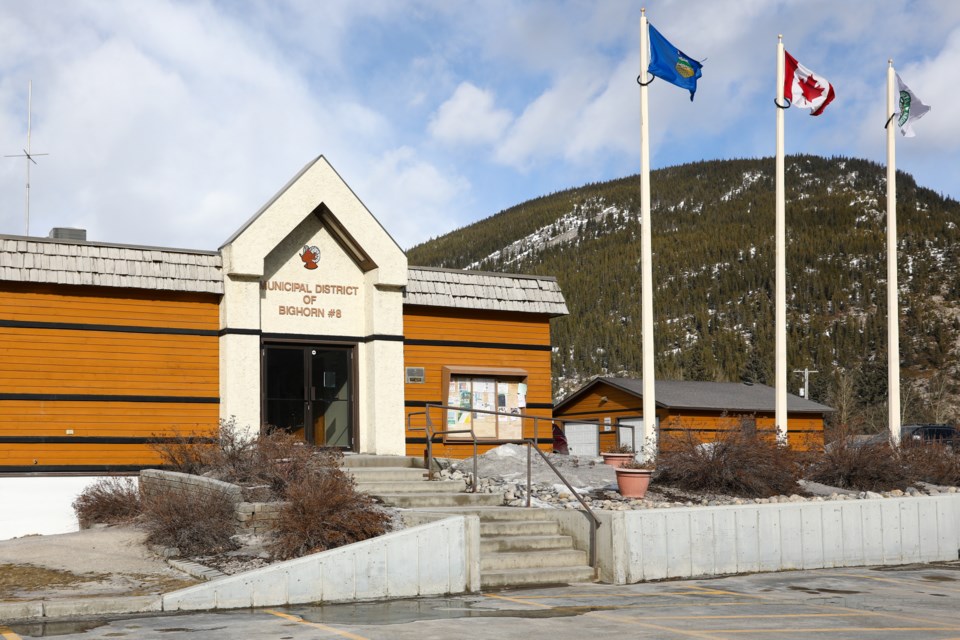MD OF BIGHORN – A land use omnibus bylaw in planning since 2018 and with over 50 amendments passed third reading of MD council.
The bylaw aims to streamline the development process in the MD of Bighorn and provide clarity to planning staff and applicants but council debate has been muddy on defining uses of wet bars and kitchens in short- and long-term accommodations and B&Bs.
Defining the difference is a measure aimed at preventing illegal secondary suites and wet bars being used as kitchens, which administration has had enforcement issues with in the past, but Reeve Lisa Rosvold argued language in the bylaw was unclear and too restrictive.
“I think people should be able to have a counter or cabinets, or a little sink, or install a microwave,” said Rosvold.
Under the bylaw’s definition, the reeve worried these items could be determined as non-compliant with a permitted wet bar as items one might find in a second kitchen, which isn’t permitted without a development permit for an accessory use.
“This does not sit well with me, it’s not clear,” she said.
“The new definition [of wet bar] would mean that the majority of people that have a B&B permit are out of compliance.
“I don’t know what would happen if we approved everything and their permit expires next week and now they have the new rules to follow. Do they need to take out a microwave that was built into their cabinet? It says they can’t even have countertops. That is where I see the biggest issue.”
Rosvold was successful in a push to remove the definition from the land use bylaw until council can have further discussion specific to uses of short- and long-term suites and B&Bs, which council agreed needs its own comprehensive review with growing development pressures in the MD.
“There are some amendments in here that I really support strongly and would love to approve today, but I think it’s in our best interest to look at all of them holistically and not just review the ones we looked at today, but review all of them that are part of those three land uses,” said the reeve.
Other changes for suites and B&Bs were around lengthening development permit renewals approved under the bylaw but also flagged for further review later.
Development permits are currently issued on a one-year basis and require renewals yearly. A one-year trial period was a new use introduced to the land use bylaw in 2018, but as the use has in operation for five years, it was recommended renewals be increased from one year to three.
For B&Bs, a one-year trial period was removed and the renewal period was increased from three to five years.
There is also currently a waitlist for visitor accommodation suites as the bylaw has a 30 per cent cap within the R1-S district of Dead Man’s Flats and Exshaw. Increasing the cap would involve public consultation and could be considered as a separate bylaw amendment in the future, a staff report noted.
There were five submissions during a public hearing after first reading in January 2023, mainly with concerns around proposed renewal period changes and disparities between changes for short- and long-term suites and B&Bs.
Rosvold said since the public hearing, she has heard from other operators in the MD on these and other amendments.
“I think because some of the impacts of these changes weren’t fully understood when the public hearing was advertised, I’ve heard from a lot of long-term, short-term and B&B operators that before this didn’t realize that this was impacting them,” she said. “That’s where my hesitation comes from to move forward with those amendments.”
While the reeve tried to axe renewal changes and other sections pertaining to suites and B&Bs out of the bylaw as well, there was push back from Couns. Jen Smith and Rick Tuza to keep the changes and review them further down the road.
“I would really like to pass this as is and put urgency on going through all of these ones that were highlighted,” said Smith. “I don’t want them removed. I want them to remain and pull them out and we can do a deeper dive into these after.”
Smith, who is a council representative on the MD’s municipal planning commission noted the changes will make life easier for MPC during a time of growth in the MD, in addition to adding clarity for development officers and applicants.
She asked realistically how quickly another bylaw could come forward to review uses around short- and long-term suites and B&Bs.
“We are in a time of growth right now so how realistic of a timeline do we have on getting these done. If we pull these out today, are we getting new applications that aren’t going to be captured with some new wording,” she asked. “I’m concerned about leaving a gap that this captures right now.”
Council directed administration to draft another bylaw to discuss uses around short- and long-term suites and B&Bs and was advised it would go through the same process as the omnibus bylaw with intent for three readings and a public hearing.
The MD’s land use bylaw was adopted in 2018 and since then the planning department has been tracking a potential list of amendments to ensure it is current and effective in regulating developments in the MD.
Most of the other amendments passed were largely housekeeping items, adding new wording and definitions, and replacing the Alberta Building Code with the National Building Code – 2019 Alberta Edition.
The Local Journalism Initiative is funded by the Government of Canada. The position covers Îyârhe (Stoney) Nakoda First Nation and Kananaskis Country.




